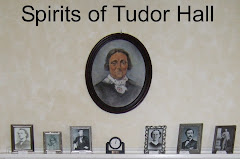Wildflower Enthusiasts: Even though the grounds at Tudor Hall, including the spacious lawns, receive maintenance on a regular basis from the Harford County Department of Parks and Recreation, there are a number of wildflowers that grow and blossom from the spring through the fall at Tudor Hall. We would welcome volunteers to identify and record the numerous varieties of wildflowers at Tudor Hall with the eventual goal of creating a brochure that will tell visitors what wildflowers they might see at Tudor Hall during the spring, summer, and autumn months.
Wildlife Observers: Despite the development that has steadily closed in on Tudor Hall, there are still a number of wild animals who frequently visit the property or make it their home. Getting a glimpse of the deer, foxes, snakes, frogs, and other animals that live in the area and recording their presence and activities would require patience and luck on the part of a volunteer.
Entomologists: A wide variety of insects are active at Tudor Hall throughout the year but especially in the spring, summer, and fall. If you have an interest in insects and would like to prepare information to share with visitors about them, please let us know. However, remember that Junius Brutus Booth Sr. declared Tudor Hall a “no kill” zone even when it came to lowly flies.
Tree Huggers: Over the years, Tudor Hall has been known for the wide variety of large, mature trees that have graced the grounds since the house was built. In fact, while the foundation for Tudor Hall was being built, Junius Brutus Booth Sr. insisted that the black locust trees growing near the building site should not be cut down. Not only are we looking for volunteers to identify and inventory the various kinds of trees and shrubs growing at Tudor Hall today, but we would like like to find a volunteer to create a map showing the location of each of the trees. Our eventual goal is to create a brochure or booklet that will tell visitors which trees they will see when they visit Tudor Hall.
Return of the Big Woods: The neighborhood where Tudor Hall is located was once the home of the “Big Woods.” Carefully planned reforestation of some of the grounds at Tudor Hall would not only reduce the expense to Harford County of maintaining the grounds but would be good for the environment. Researching and writing a proposed reforestation plan for Tudor Hall would be a good science project for a high school student or Eagle Scout.
Wildlife and Nature Photographers: It goes without saying that good quality photos of the birds, wildflowers, trees, and seasons at Tudor Hall would be very useful in creating printed materials and slide or PowerPoint presentation
Mapmakers: Many visitors to Tudor Hall ask where the boundaries of the original Booth farm were located. If you have a knack for creating accurate maps and enjoy working with land records from an earlier time, we would certainly welcome your help in creating accurate maps of the Tudor Hall property as it has evolved through the years and as it exists today.
Archeology Students or Professionals: The grounds at Tudor Hall would be an exciting place to conduct archeological explorations. However, careful, thoughtful, and extensive planning is required. Such planning would take a great deal of research and coordination among a variety individuals and organizations all of which would be very time consuming. Volunteers with training and experience in the field of archeology who are willing to make a substantial commitment of time and energy would be most welcome in helping create a viable plan for eventual review and consideration by the Harford County Department of Parks and Recreation.
Contact spirits-of-tudor-hall@msn.com for more info on any and all volunteer opportunities.

